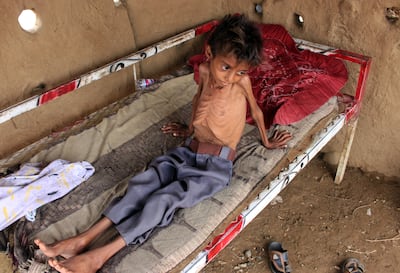US Special Envoy to Yemen Tim Lenderking on Tuesday called for increased engagement and support for a Yemeni-led peace process.
“We are at a critical moment — we must preserve the positive momentum and gains made since April,” Mr Lenderking told the House Foreign Affairs Committee in a hearing on the country's ongoing civil war.
Mr Lenderking praised the UN-brokered ceasefire between the internationally recognised Yemeni government and the Houthi rebels.
The truce, which began on April 2 and was extended twice, expired in early October, with the Iran-backed Houthis rejecting efforts by the UN special envoy for Yemen, Hans Grundberg, to extend the truce for a further six months.
Despite a failure to extend that ceasefire, the US envoy said that efforts to achieve lasting peace are in “a new phase”, and that “there's probably more engagement between the conflict parties now than there has been at any time”.
“This gives us some hope, that in coming months, we will see some more positive movement back towards a truce, a ceasefire and the political negotiations which ultimately could end the conflict,” Mr Lenderking said.
Although the US special envoy expressed his belief that Yemen “has a unique opportunity for peace”, he cautioned that the situation remains fragile.
“We have witnessed Houthis backtracking on their commitments, introduction of maximalist demands, and most worrying, a series of recent attacks threatening international maritime shipping,” Mr Lenderking said.
Last week, the Houthis announced they would keep “protecting” Sanaa's oil and gas resources, after the US called on them to halt continued attacks on ports.
When questioned on “diverging interests” among Washington's partners in Yemen, Mr Lenderking said that there is “very important co-ordination” happening between the UN, the UAE and Saudi Arabia.
“I believe from my own conversations with the Emirates, many trips to the UAE over the course of the last year, that they are fully on board with moving in the direction that [Washington is] in terms of resolving the conflict,” Mr Lenderking added.
Mr Lenderking praised the UAE's support for an extension of the ceasefire in October during a meeting with Sheikh Abdullah bin Zayed, UAE Minister of Foreign Affairs and International Co-operation.
Washington is calling for increased humanitarian support from its Gulf and European partners, the committee heard, as it expects a decline in funding in the coming year.
Yemen is enduring a man-made humanitarian disaster caused by eight years of civil war. By late 2022, more than 17.8 million people, including 9.2 million children, lacked access to safe water, sanitation and hygiene services, according to the UN.
The country continues to experience regular outbreaks of cholera, measles, diphtheria and other vaccine-preventable diseases.

Sarah Charles, assistant to the administrator for humanitarian assistance at the US Agency for International Development (USAID), said that the Humanitarian Response Plan for Yemen had received only half of its required funding, with Washington providing much of that amount.
The US “is working quite aggressively to secure other donor commitments to Yemen”, Ms Charles told the committee.
She said securing more funding from Saudi Arabia, Kuwait and the UAE is “a feature of Washington's diplomacy” with its Gulf partners.
“We call on other donors, particularly Gulf donors, to urgently scale up financial contributions and turn what pledges they had made into people actually reached,” said Ms Charles.
Last week, UAE President Sheikh Mohamed hosted Rashad Al Alimi, chairman of the Presidential Leadership Council in Yemen, at Al Shati Palace in Abu Dhabi for talks on increased co-operation.
The Yemeni leader briefed the UAE President on the latest developments, amid bilateral discussions on supporting peace in the country, ease the suffering of its people, and achieving its aspirations for stability and development.










